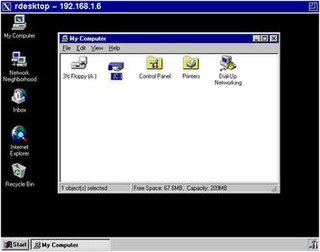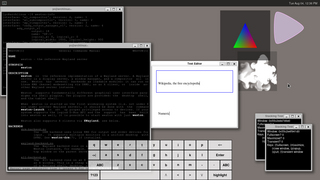The Open Sound System (OSS) is an interface for making and capturing sound in Unix and Unix-like operating systems. It is based on standard Unix devices system calls. The term also sometimes refers to the software in a Unix kernel that provides the OSS interface; it can be thought of as a device driver for sound controller hardware. The goal of OSS is to allow the writing of sound-based applications that are agnostic of the underlying sound hardware.
freedesktop.org (fd.o) is a project to work on interoperability and shared base technology for free-software desktop environments for the X Window System (X11) and Wayland on Linux and other Unix-like operating systems. It was founded by Havoc Pennington, a GNOME developer working for Red Hat in March 2000. The project's servers are hosted by Portland State University, sponsored by Hewlett-Packard, Intel, and Google.
aRts is an audio framework that is no longer under development. It was best known for previously being used in K Desktop Environment 2 and 3 to simulate an analog synthesizer.

Rhythmbox is a free and open-source audio player software, tag editor and music organizer for digital audio files on Linux and Unix-like systems.
A sound server is software that manages the use of and access to audio devices. It commonly runs as a background process.
In computing, D-Bus is a message-oriented middleware mechanism that allows communication between multiple processes running concurrently on the same machine. D-Bus was developed as part of the freedesktop.org project, initiated by Havoc Pennington from Red Hat to standardize services provided by Linux desktop environments such as GNOME and KDE.
Music Player Daemon (MPD) is a free and open music player server. It plays audio files, organizes playlists and maintains a music database. In order to interact with it, a client program is needed. The MPD distribution includes mpc, a simple command line client.

rdesktop is an implementation of a client software for Microsoft's proprietary Remote Desktop Protocol (RDP). Rdesktop is free and open-source software, subject to the requirements of the GNU General Public License (GPL-3.0-or-later), and is available for Linux and BSD as well as for Microsoft Windows.

Phonon is the multimedia API provided by KDE and is the standard abstraction for handling multimedia streams within KDE software and also used by several Qt applications.

PulseAudio is a network-capable sound server program distributed via the freedesktop.org project. It runs mainly on Linux, various BSD distributions such as FreeBSD and OpenBSD, macOS, as well as Illumos distributions and the Solaris operating system.
Oracle Secure Global Desktop (SGD) software provides secure access to both published applications and published desktops running on Microsoft Windows, Unix, mainframe and IBM i systems via a variety of clients ranging from fat PCs to thin clients such as Sun Rays.
This page is a comparison of notable remote desktop software available for various platforms.
Adaptive Internet Protocol (AIP) is a multi-channel protocol that allows an application running on any of multiple platforms to be displayed on any of a wide range of client systems. It supports rich remote display and input services with a number of display options to deliver the presentation of the remote applications onto the local display either as a standalone window, or within a contained remote environment delivered full-screen or in a standalone window. The protocol also supports audio, printing, and other device mapping services.
GVfs is GNOME's userspace virtual filesystem designed to work with the I/O abstraction of GIO, a library available in GLib since version 2.15.1. It installs several modules that are automatically used by applications using the APIs of libgio. There is also FUSE support that allows applications not using GIO to access the GVfs filesystems.
Remote Desktop Services (RDS), known as Terminal Services in Windows Server 2008 and earlier, is one of the components of Microsoft Windows that allow a user to take control of a remote computer or virtual machine over a network connection. RDS is Microsoft's implementation of thin client architecture, where Windows software, and the entire desktop of the computer running RDS, are made accessible to any remote client machine that supports Remote Desktop Protocol (RDP). User interfaces are displayed from the server onto the client system and input from the client system is transmitted to the server - where software execution takes place. This is in contrast to application streaming systems, like Microsoft App-V, in which computer programs are streamed to the client on-demand and executed on the client machine.

Jami is a SIP-compatible distributed peer-to-peer softphone and SIP-based instant messenger for Linux, Microsoft Windows, OS X, iOS, and Android. Jami was developed and maintained by the Canadian company Savoir-faire Linux, and with the help of a global community of users and contributors, Jami positions itself as a potential free Skype replacement.

Wayland is a communication protocol that specifies the communication between a display server and its clients, as well as a C library implementation of that protocol. A display server using the Wayland protocol is called a Wayland compositor, because it additionally performs the task of a compositing window manager.
WildMIDI is a free open-source software synthesizer which converts MIDI note data into an audio signal using GUS sound patches without need for a GUS patch-compatible soundcard. WildMIDI, whose aim is to be as small as possible and easily portable, started in December 2001, can act as a virtual MIDI device, capable of receiving MIDI data from any program and transforming it into audio on-the-fly. It is the standard MIDI renderer for the GStreamer framework.






